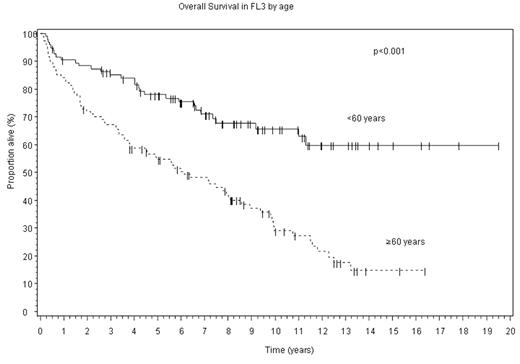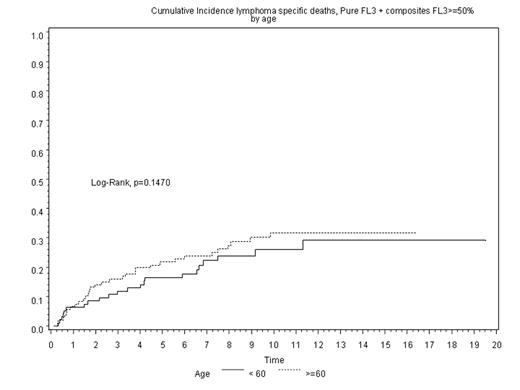Abstract
Clinical prognostic factors for grade 3 follicular lymphoma (FL3), using the new WHO classification, have not yet been clearly defined. Hence, we conducted a retrospective study to identify the outcome and clinical features predictive of survival in patients with FL3. Two hundred and two patients diagnosed with FL3 using the Berard criteria, who were staged and treated with various aggressive combination chemotherapy regimens containing either an anthracycline or mitoxantrone, are included in this study. After a median follow-up of 8.4 years (range, 0.5 – 19.5 years), 105 patients (52%) have died and 97 patients (48%) are alive at last contact. The estimated 10-yr event-free survival (EFS) and overall survival (OS) are 34% (95% CI: 26–41%) and 45% (95% CI: 37–53%), respectively. By multivariate analysis, older age (≥60 years; Figure 1) and a low hemoglobin (<12 gm/dL) were independent adverse predictors of OS (RR: 2.3, 95% CI: 1.5–3.7, p=0.0002; and RR: 1.9, 95% CI 1.2–3.0, p=0.0095, respectively). A low hemoglobin and advanced stage (III/IV) at presentation were independent adverse predictors of EFS (RR: 1.8, 95% CI: 1.2–2.8, p=0.0072; and RR: 1.7, 95% CI: 1.1–2.5, p=0.0096 respectively). When patients were compared based on age, there were no significant differences in the distribution of adverse prognostic factors among patients ≥60 years of age as compared to younger patients. There were also no differences in the frequency of relapse/progression (10-year rate of 50% in patients <60 years vs. 44% in patients ≥60 years, p=0.71) or lymphoma-specific/treatment-related deaths between the two age groups (10-year rate of 30% in patients <60 years vs. 35% in patients ≥60 years, p=0.17; Figure 2). Although younger patients (<60 years) had a significantly better OS and EFS as compared to older patients, there were no differences in the relapse/progression rates or lymphoma/treatment-related survival. Thus, aggressive combination chemotherapy led to durable remissions in 50–60% of patients with FL3.
Author notes
Corresponding author



This feature is available to Subscribers Only
Sign In or Create an Account Close Modal